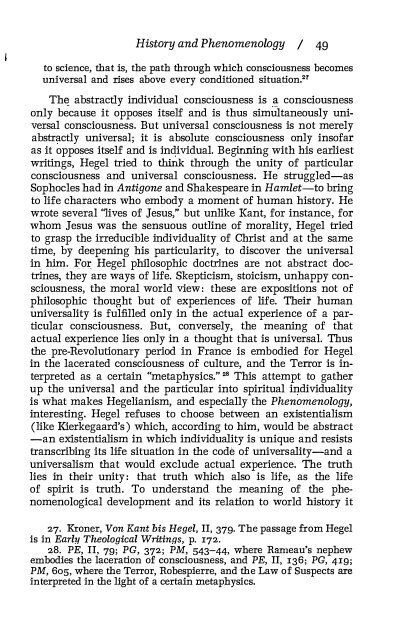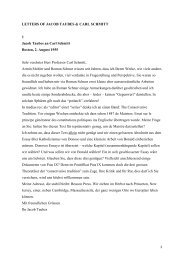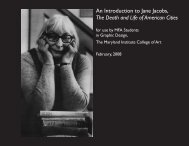selection one - Sound and Signifier
selection one - Sound and Signifier
selection one - Sound and Signifier
You also want an ePaper? Increase the reach of your titles
YUMPU automatically turns print PDFs into web optimized ePapers that Google loves.
History <strong>and</strong> Phenomenology / 49<br />
to science, that is, the path through which consciousness becomes<br />
universal <strong>and</strong> rises above every conditi<strong>one</strong>d situation.21<br />
Th abstractly individual consciousness is l:!- consciousness<br />
only because it opposes itself <strong>and</strong> is thus simultaneously universal<br />
consciousness. But universal consciousness is not merely<br />
abstractly universal; it is absolute consciousness only insofar<br />
as it opposes itself <strong>and</strong> is individual. Beginning with his earliest<br />
writings, Hegel tried to think through the unity of particular<br />
consciousness <strong>and</strong> universal consciousness. He struggled-as<br />
Sophocles had in Antig<strong>one</strong> <strong>and</strong> Shakespeare in Hamlet-to bring<br />
to life characters who embody a moment of human history. He<br />
wrote several "lives of Jesus," but unlike Kant, for instance, for<br />
whom Jesus was the sensuous outline of morality, Hegel tried<br />
to grasp the irreducible individuality of Christ <strong>and</strong> at the same<br />
time, by deepening his particularity, to discover the universal<br />
in him . For: Hegel philosophic doctrines are not abstract doctrines,<br />
they are ways of life. Skepticism, stoicism, unhappy consciousness,<br />
the moral world view : these are expositions not of<br />
philosophic thought but of experiences of life. Their human<br />
universality is fulfilled only in the actual experience of a particular<br />
consciousness. But, conversely, the meaning of that<br />
actual experience lies only in a thought that is universal. Thus<br />
the pre-Revolutionary period in France is embodied for Hegel<br />
in the lacerated consciousness of culture, <strong>and</strong> the Terror is interpreted<br />
as a certain "metaphysics." 28 This attempt to gather<br />
up the universal <strong>and</strong> the particular into spiritual individuality<br />
is what makes Hegelianism, <strong>and</strong> especially the Phenomenology,<br />
interesting. Hegel refuses to choose between an existentialism<br />
(like Kierkegaard's ) which, according to him , would be abstract<br />
-an existentialism in which individuality is unique <strong>and</strong> resists<br />
transcribing its life situation in the code of universality-<strong>and</strong> a<br />
universalism that would exclude actual experience. The truth<br />
lies in their unity : that truth which also is life, as the life<br />
of spirit is truth. To underst<strong>and</strong> the meaning of the phenomenological<br />
development <strong>and</strong> its relation to world history it<br />
27. Kr<strong>one</strong>r, Von Kant his Hegel, II, 379. The passage from Hegel<br />
is in Early Theological Writings, p. I72.<br />
28. PE, II, 79; PG, 372; PM, 543-44, where Rameau's nephew<br />
embodies the laceration of consciousness, <strong>and</strong> PE, II, I36; PG, 4I9;<br />
PM, 605, where the Terror, Robespierre, <strong>and</strong> the Law of Suspects are<br />
interpreted in the light of a certain metaphysics.




